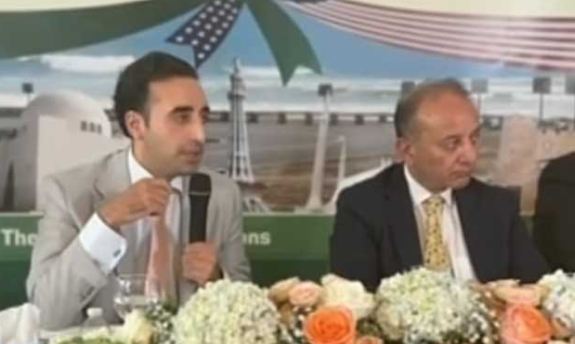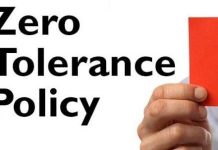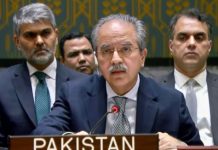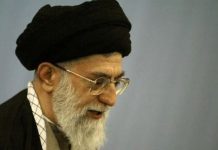WASHINGTON, JUN 7: Pakistan Peoples Party (PPP) Chairman Bilawal Bhutto Zardari on Saturday said the recent five-day conflict had exposed India’s façade as a so-called “net security provider,” revealing it instead as a source of insecurity for South Asia and the wider global community.
“India’s actions had dangerously lowered the threshold for armed confrontation in the region… they started a war based on a lie and couldn’t even win it,” he said while speaking at a luncheon hosted by Pakistan Ambassador to the US Rizwan Saeed in honour of the Pakistani multi-party delegation in Washington, DC.
The former foreign minister, along with a nine-member high-level parliamentary delegation, is currently visiting the US, to present Pakistan’s stance on the recent military confrontation with India and to challenge New Delhi’s narrative at the international level.
Members of the parliamentary delegation include Hina Rabbani Khar, Sherry Rehman, Dr Musadik Malik, Khurram Dastgir Khan, Jalil Abbas Jilani, Tehmina Janjua, Bushra Anjum Butt and Syed Faisal Subzwari.
The Bilawal-led high-level diplomatic delegation has met various US lawmakers and held a series of significant meetings with members of the US Congress on Capitol Hill to highlight New Delhi’s provocations and aggression against Islamabad.
The recent conflict between the nuclear-armed countries was triggered by New Delhi after an attack in Indian Illegally Occupied Jammu and Kashmir’s Pahalgam on April 22, where gunmen killed 26 civilians. India labelled it an act of terrorism orchestrated by Pakistan, a claim denied by leaders in Islamabad.
Speaking to the attendees of the luncheon, Bilawal said that India had long portrayed itself to the West, particularly the United States, as a stabilising power, justifying foreign aid and defence deals.
“The American taxpayers’ dollars are subsidising India’s military-industrial complex under the illusion that it provides regional stability. But these five days of conflict proved otherwise,” he said, stressing that a peaceful and stable relationship between India and Pakistan is the only viable path toward security in South Asia.
Citing disinformation as a consistent tool of Indian statecraft, he criticised the Indian media for promoting fake news during the conflict.
“Three parties are making claims in this situation — Pakistan, the US, and India. Two of them are saying one thing, and the third is saying something else. It’s about figuring out who’s telling the truth,” he noted, emphasising that India has yet to share any credible information about the incident in IIOJK — including who the alleged terrorists were, or what damage they suffered during the conflict.
The PPP chief said even now, India refuses to admit the number of aircraft it lost and instead continues to rely on disinformation — a tactic not only used during the conflict but also during international engagements by its delegations.
Referring to a tweet by US Senator Marco Rubio, Bilawal said it pointed to three key developments: the ceasefire, the beginning of future talks in a neutral location, and discussions covering all points of friction. “This shows that the international community doesn’t see India’s narrative as credible,” he added.
Responding to a question, he noted that Pakistan never needed to invoke its nuclear capabilities to assert dominance. “We didn’t rely on our nuclear arsenal to deter aggression. Our conventional response was sufficient,” he said.
He also addressed Indian Prime Minister Narendra Modi’s aggressive rhetoric, quoting his inflammatory remarks like “Eat bread or eat my bullet,” which Bilawal said made it impossible to revise Pakistan’s policies in an atmosphere of hostility.
On the issue of extremism and terrorism, Bilawal called for a unified, depoliticised approach. “I don’t associate terrorism with any religion or culture. It has no borders and must be condemned universally,” he said, urging all countries to reject terrorism in all its forms — whether religious, nationalist, or separatist.
He also criticised the rise of Hindutva extremism in India, saying it was deeply rooted in society and state structures. “Extremism in India is now a new reality… the word ‘terrorism’ is used as a wolf whistle to demonise minorities — particularly Muslims in India, IIOJK, and in the neighbouring region.”
“From the Gujarat riots to the Samjhauta Express attack, those responsible have never been punished — in fact, they’ve often been pardoned,” he said, pointing to the RSS, the ideological parent of India’s ruling BJP, as the core driver of this extremist agenda.
He called for an end to blame games and urged both countries to work together to combat terrorism and establish peace. “Instead of finger-pointing and feeding the cycle of hostility, we must strive for dialogue and stability. That is the only way forward,” he concluded.

















